|
1 Dover Street (Upper Bridge Street)
(Cattle Market 1838 ) )
Canterbury
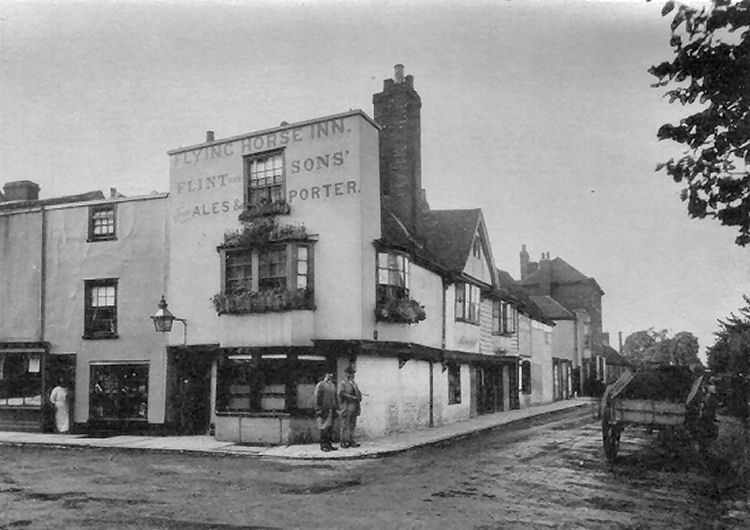
Above photo, 1866, kindly submitted by Rory Kehoe. |
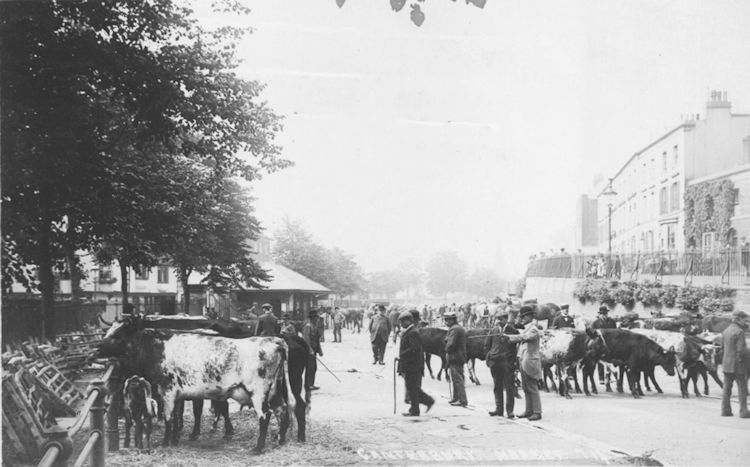
Above photo, circa 1903, kindly sent by Rory Kehoe.
An action photograph of Canterbury's cattle market, taken, looking
west, from around where the New Dover Road roundabout now sits. The
market operated for many years and occupied the area, adjacent to Upper
Bridge Street, which now hosts part of the four-lane city ring road.
Left of centre is the market office building and just visible through
the trees is the Flying Horse. On market days, the pub did a brisk trade
with farmers, stockmen and drovers, all popping in to do business and
slake their thirsts. The cattle market closed in 1955 and moved to a
purpose-made site, still known as Market Way, which lies about 100m to
the south of St. Stephen's level crossing. |
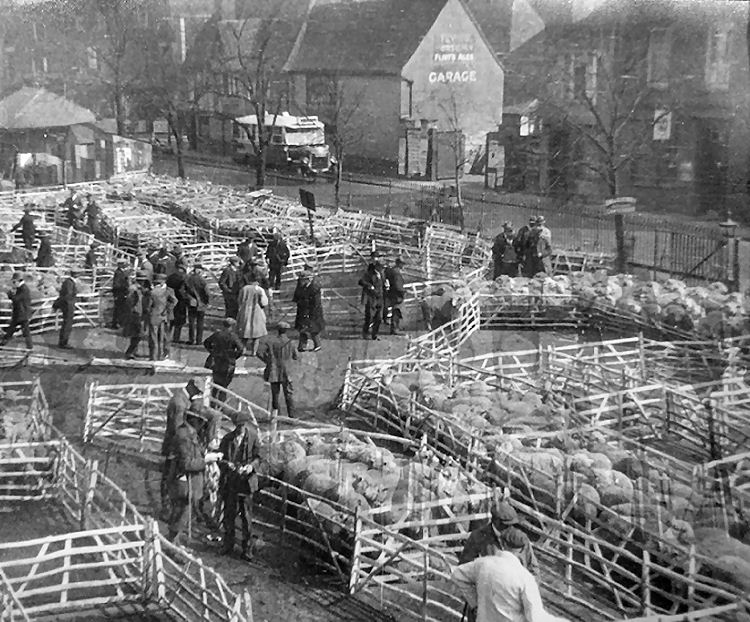
Above photo, circa 1924. Kindly sent by Rory Kehoe. |
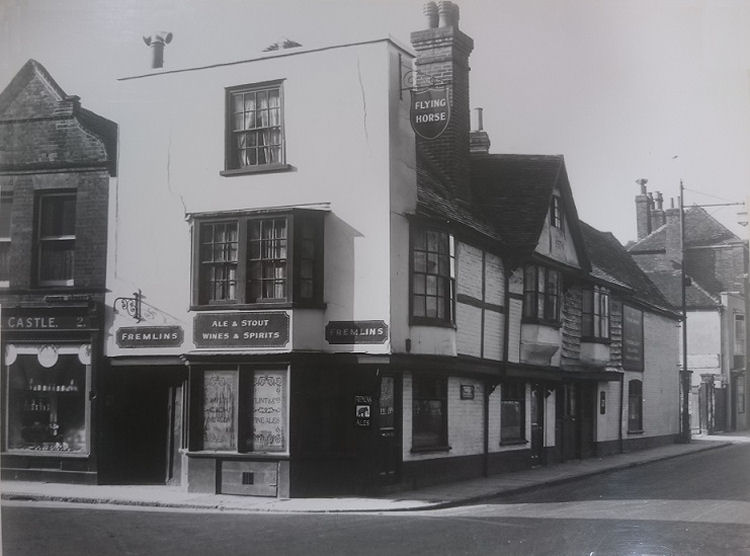
Above photo, circa 1938, kindly sent by Rory Kehoe. |
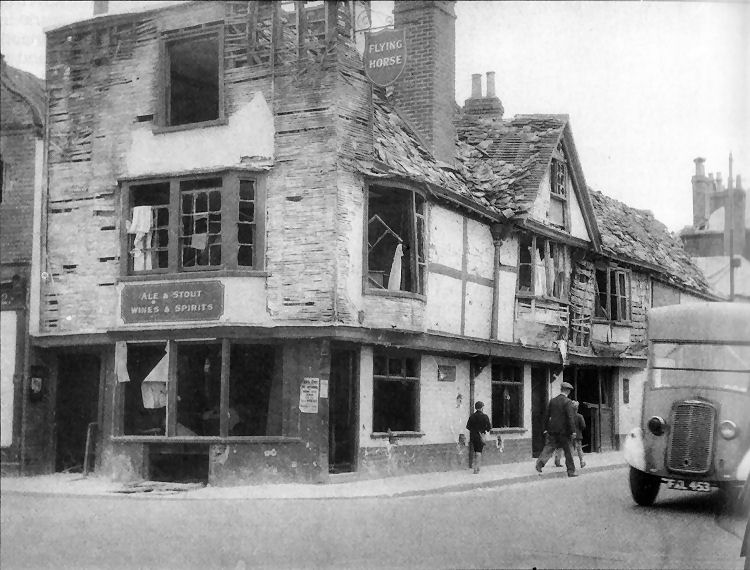
Above photo showing the "Flying Horse" shortly after the 1940 Luftwaffe
air raid on Canterbury. |
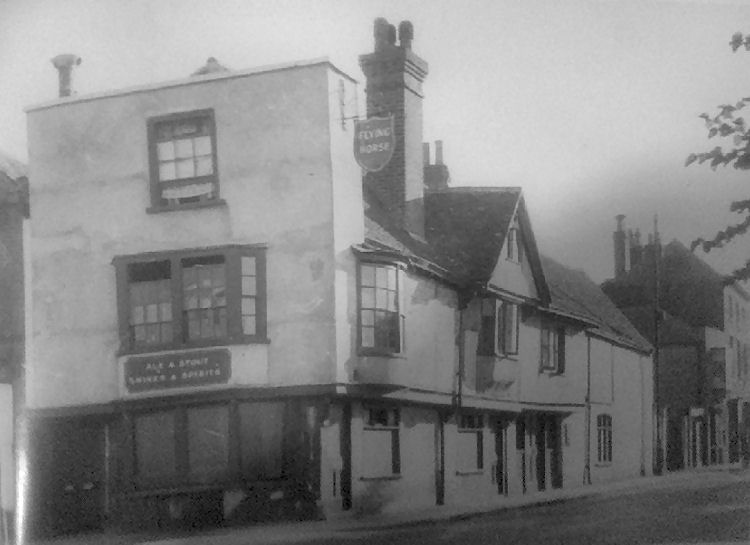
Above photo, circa 1946, kindly sent by Rory Kehoe. |
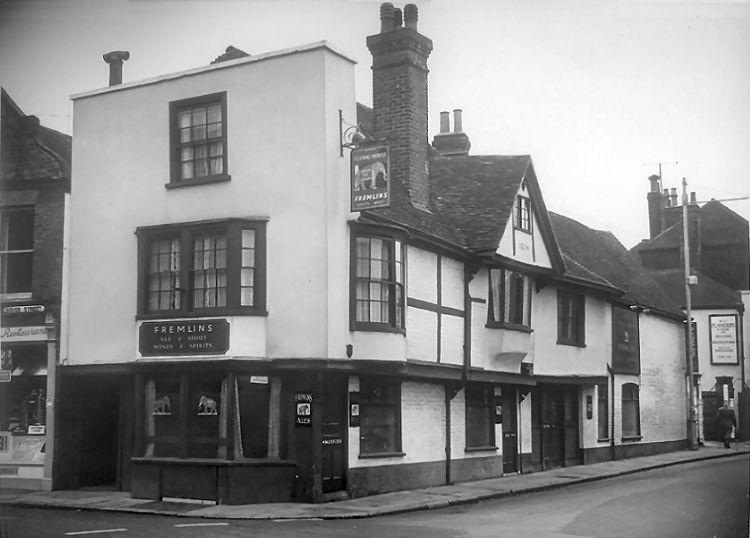
Above photo, circa 1951, kindly sent by Rory Kehoe. |
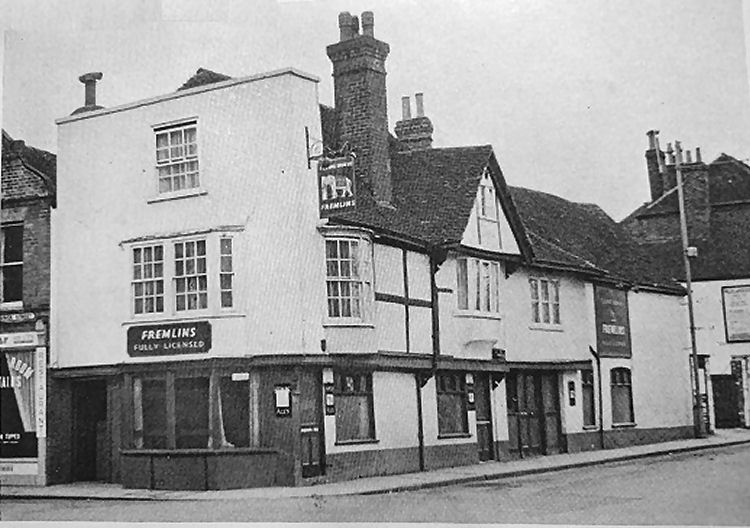
Above photo, circa 1955, kindly submitted by Rory Kehoe. |
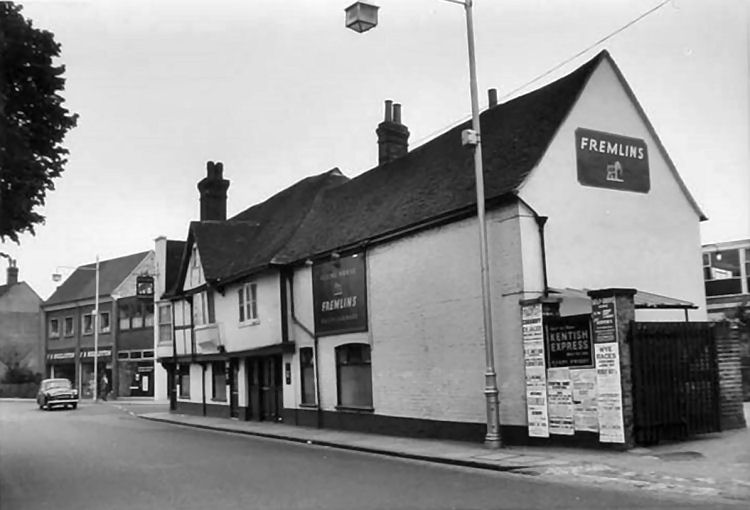
Above photo, 1960, kindly sent by Tim Timpson. |
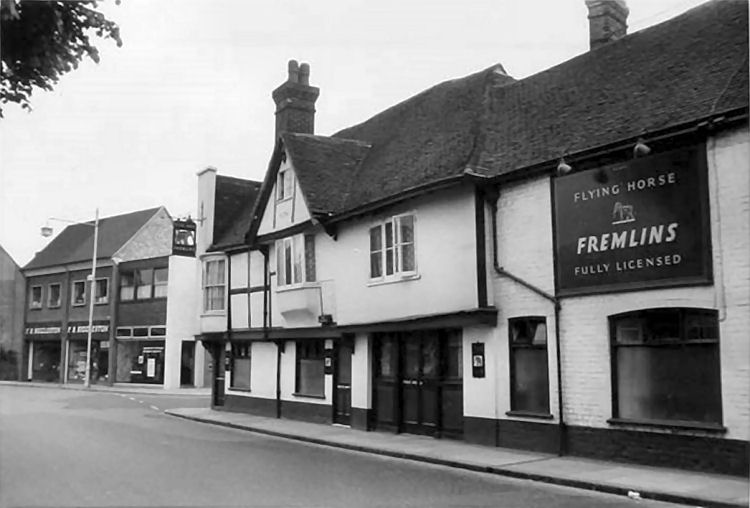
Above photo, 1960, kindly sent by Tim Timpson. |
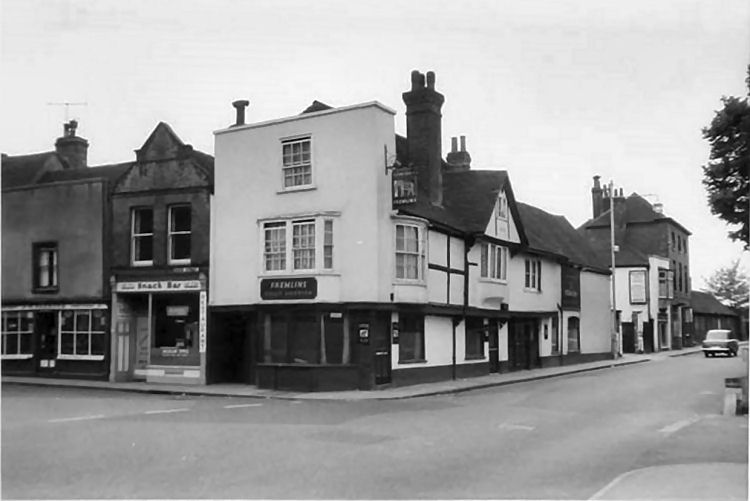
Above photo, 1960, kindly sent by Tim Timpson. |
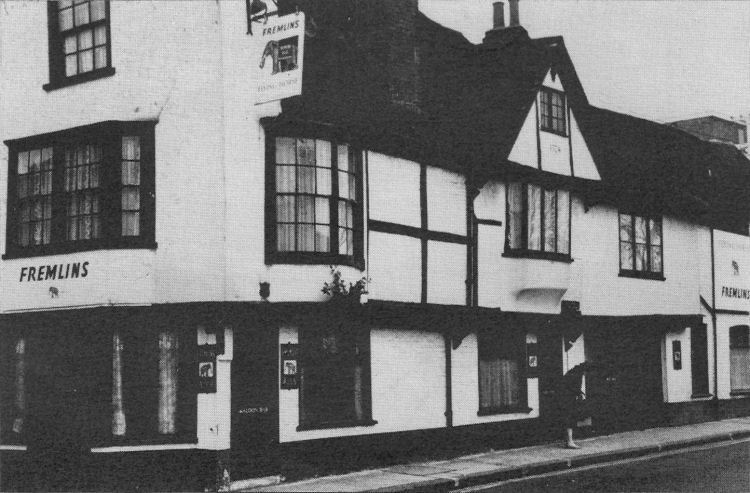
Above photograph by Edward Wilmot 1965. |
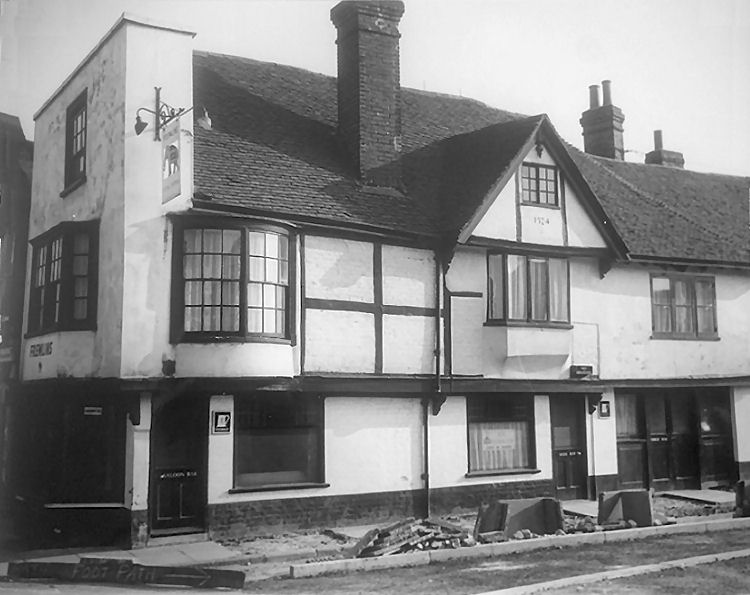
Above photo, circa 1969, kindly sent by Rory Kehoe. |
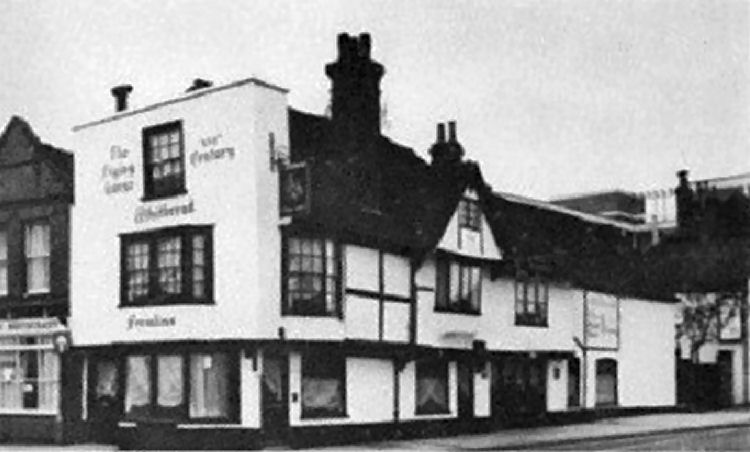
Above photo, circa 1970, kindly sent by Rory Kehoe. Caption on back
reads:- Another of the fine city of Canterbury's old inns, The Flying
Horse date from 1574 and is rightly a listed building. During the
coaching era, it was Canterbury's principal coaching inn for the
London/Dover run and is one of the three Canterbury inns to have a
tunnel to the Cathedral. With very little change to its interior, it
offers warm hospitality, with a full range of Whitbread's beers,
including Mild Ale and a wide range of bar snacks. A restaurant is to be
opened shortly. Good parking facilities..." |
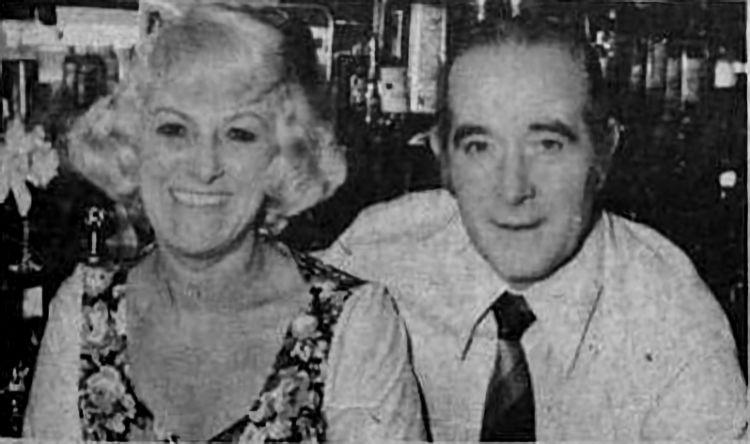
Above photo, 1978, showing licensees Iris and Bill ???? |
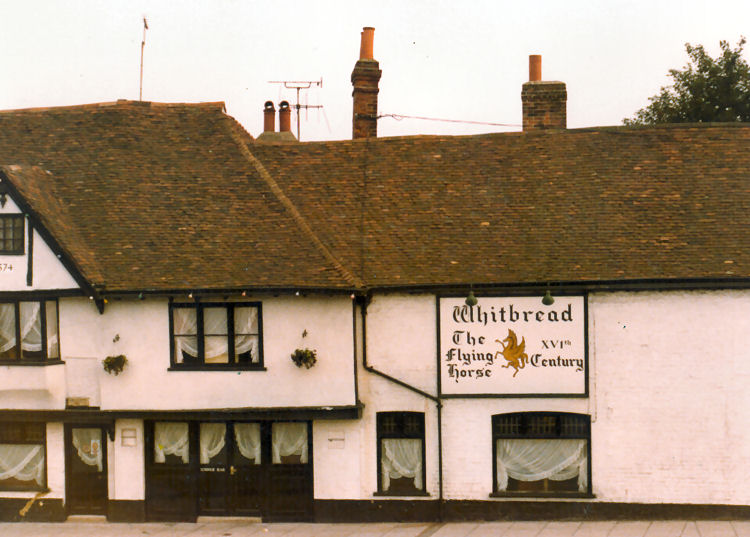
Above photo, circa 1980, kindly sent by Jim Hurling. (USA). |
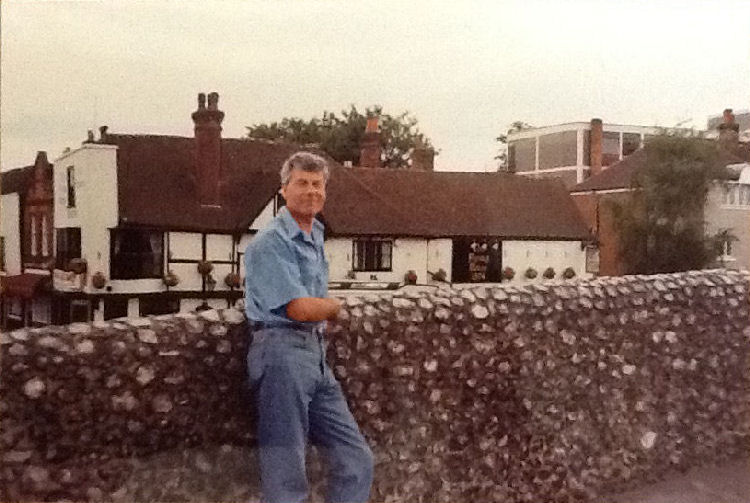
Above photo, 1990, kindly sent by Garth Wyver. |
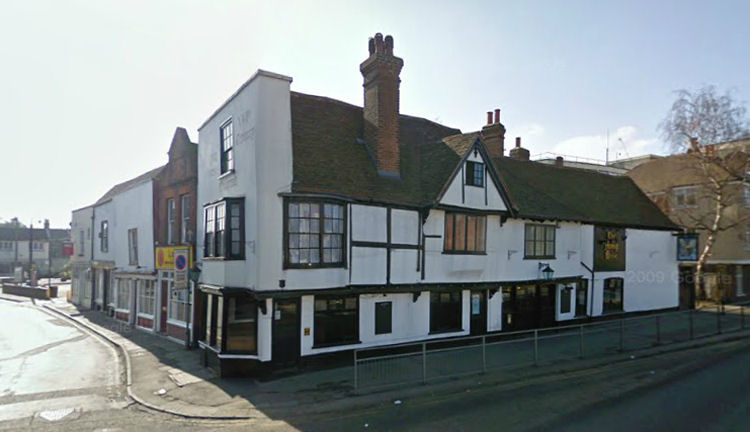
Above picture taken from Google in March 2009. |
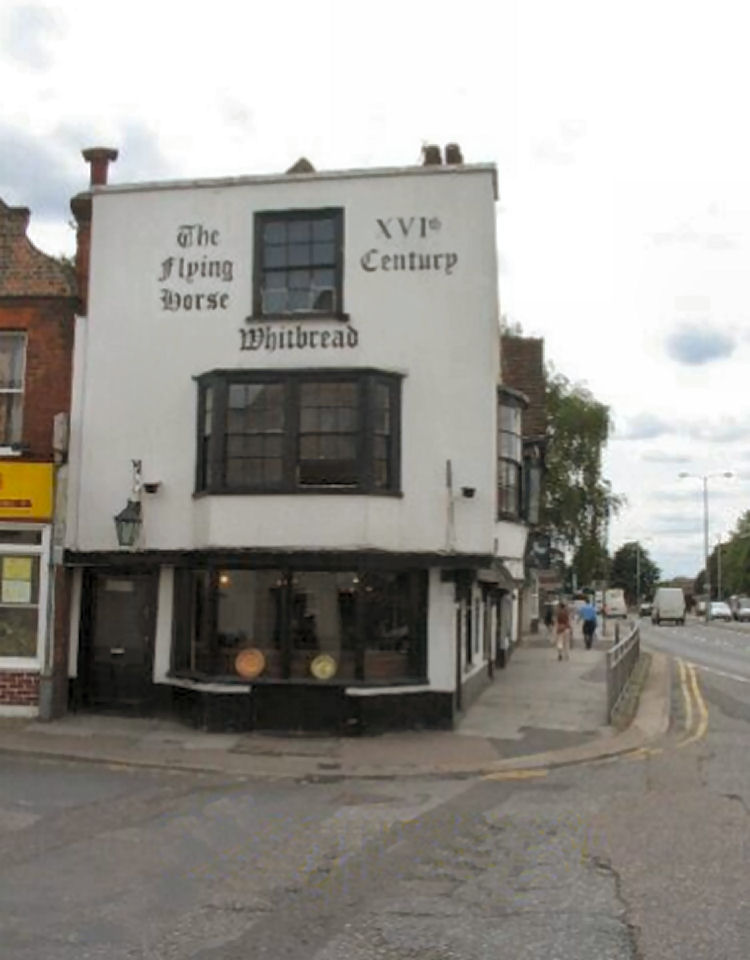
Above photo, circa 2010. |
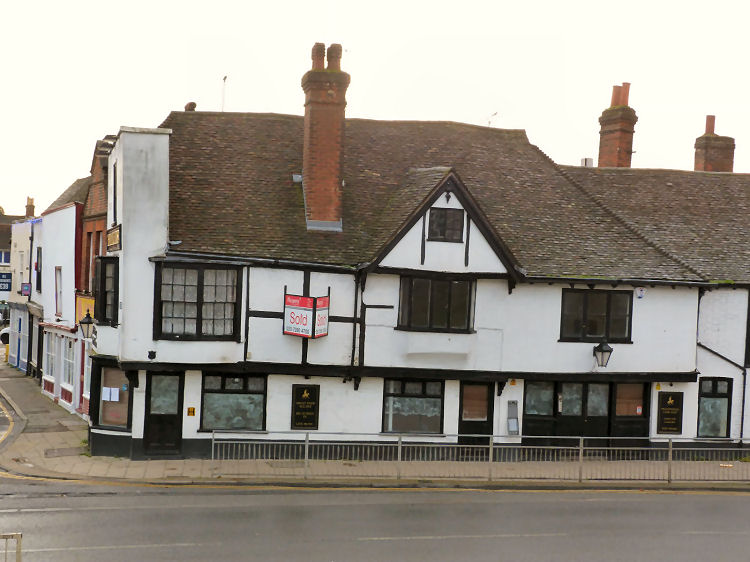
Above photo, January 2016, kindly taken and sent by Doug Pratt. |
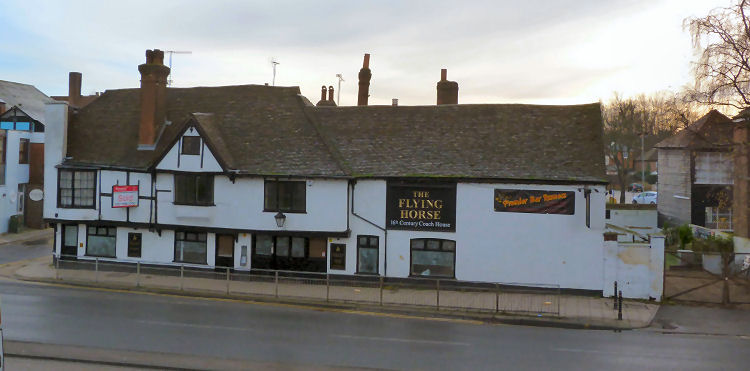
Above photo, January 2016, kindly taken and sent by Doug Pratt. |
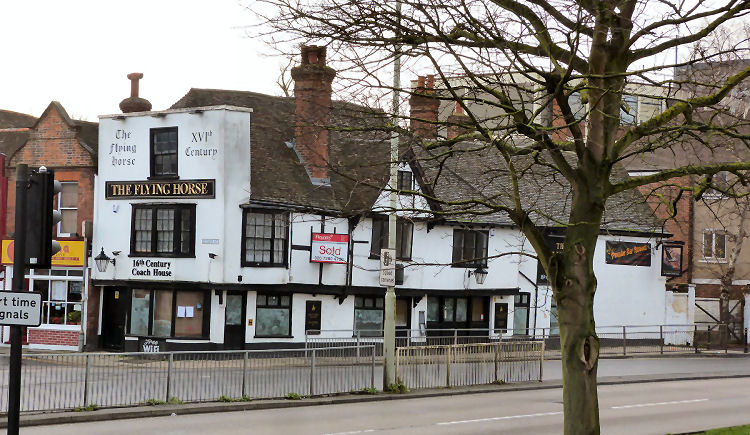
Above photo, January 2016, kindly taken and sent by Doug Pratt. |
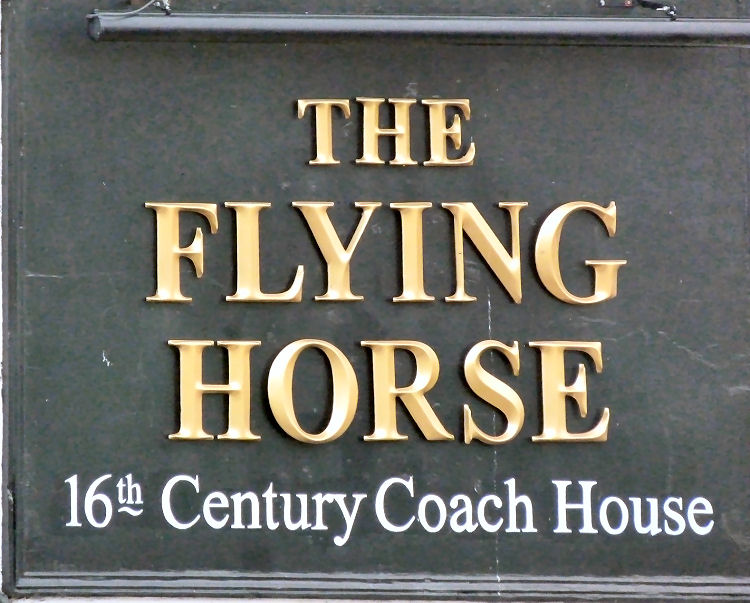
Above photo, January 2016, kindly taken and sent by Doug Pratt. |
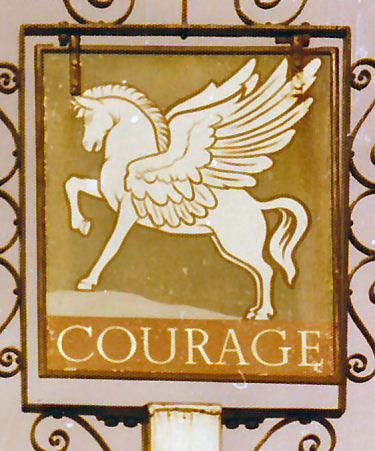 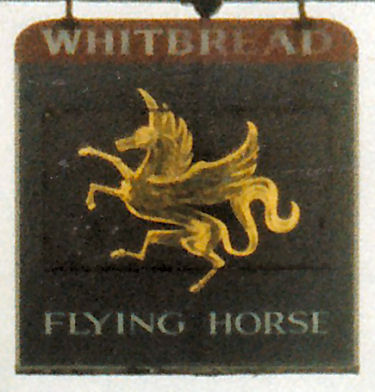
Flying Horse sign left 1980s, sign right April 1986
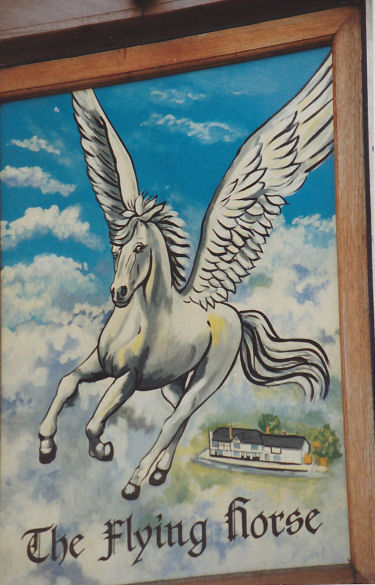 
Above sign left, October 1992, sign right, 2016.
All above with thanks from Brian Curtis
www.innsignsociety.com |

Above shows a picture of the works in 1965 when the bus station was
being created in St. George's Lane. The "Flying Horse" is the building
top left. |
Previously known as the "Rose" but on the licensing list of 1792
as the "Flying Horse."
Further research has found reference to the pub known under this name in
1768 as shown below.
|
From the Kentish Weekly Post, 17 May 1741.
Wednesday May 20.
To the worthy FREEMEN of the City of Canterbury who are Interest if
Sir THOMAS HALES.
Gentlemen,
You are desired to meet the Friends of Sir Thomas, tomorrow Morning,
being the Day of Election, at either of the following Houses, viz.
The "King's Head," in High Street,
The "Fountain," St. Margarets,
The "Dolphin," Burgate,
The "Rose," St. Georges,
The "Black Boy," Burgate,
The "Flying Horse," Dover Lane,
The "Three Compasses," St. Peter's,
The "Golden Lyon," St. Peter's,
The "Mitre," High Street,
The "Rising Sun," St. Dunstan's,
The "Black Swan," North Gate,
The "White Swan," North Gate,
The "Tolerated Soldier," North Gate,
The "Fox and Seven Stars," St. Alphage,
The "Saracen's Head," St. Pauls,
The "Maiden Head," Wincheap,
The "Two Brewers," St. Mildred's,
The "Seven Stars," St. Alphage,
The "Three Tuns," St. Margaret's.
|
|
From the Kentish Gazette, Saturday, 9 July to Wednesday, 13 July, 1768. Price 2d
LOST
On Friday last out of the Deal Coach between Sandwich and Canterbury. A
small Box of Jewellers Goods, containing Watches, &c. – Whoever has
found it, and will bring it to Mr. Robert Purvis, at the “Flying Horse”
in Canterbury, or the Printer of this Paper, shall have Five Guineas
Reward; or if any Person will give Intelligence of the said Box, so that
it may be had again, shall be entitled to the like Reward.
N.B. The Person who lost the above Box, being apprehensive some persons
may doubt the Veracity in paying the Reward, which the Finder may depend
o being paid him, subjoins the Receipt of the People who found another
Box of his lost at the same Time.
Deal, July 10, 1768.
One of the Two Boxes left yesterday between Sandwich and Canterbury, has
been found by Us and delivered to the Proprietor, who has rewarded Us to
Our Satisfaction.
TIMOTHY DUNAMOR, Witness, STEPHEN TADD.
F. Arthur, S. Reynolds.
|
|
From the Kentish Gazette, Saturday, 6 August to Wednesday, 10 August, 1768. Price 2d
STOLE OR STRAYED
From William Peake, at Vinson, near Margate, in the Isle of Thanet.
A Dunn Mare, four years old, with a long Tail, a black Lift down her
back, a white face, and three or four white Feet. – Also a Brown
Gelding, belonging to Henry Scoats, of Hegrows in the Isle aforesaid,
with a Star in his Face, nick'd Tail, and one white Foot behind.
Whoever will bring one or both to Mr. Pervis, at the “Flying Horse” near
the Cattle Market, Canterbury, shall receive two Guineas Reward for
each.
|
|
Kentish Gazette, 1 February, 1783.
CANTERBURY Feb 1.
Yesterday morning, died Mr. Purvis, Master of the "Flying Horse", in
this city.
|
|
From the Kentish Gazette, 11-15 June 1790.
Charles HOLLANDS, Victualler, Canterbury Gives notice that his wife
BEAN is not credit-worthy, will not be answerable for debts incurred by
her. She is said to have "gone off" with Serjt. SNOWDEN of the 15th
Regt. Light Dragoons, Greenwich OR with Private LISHMAN "whom she
frequently sent the serving maid after, to the "Red
Lion" in the Borough, to come up to her, at convenient times".
"Wanted, an elderly housekeeper."
|
|
From the Kentish Gazette, 10 August 1790.
Charles HOLLANDS, Canterbury
of the "Flying Horse" near Cattle Market, recently taken over the public
house.
|
|
Kentish Gazette 22 September 1812.
S. CHAPPELL.
Begs leave to return his most sincere thanks to his Friends and the
Public in general for the numerous favours he has experienced from them
while at the "Flying-Horse," Canterbury, and informs them that he has
removed from thence to "Woolpack Inn," Chilham, where he hopes that by
continuing his exertions to render every accommodation, and by keeping
good liquors, to have a continuance of those favours, which it will ever
be his study and pride most gratefully to acknowledge and maintain.
Neat Wines, good Beds, Stabling, etc.
|
|
Kentish Gazette 18 May 1819.
On Tuesday, as a lad of the name of Henry Wright, aged 14 years,
servant of Mr. Pellett, of the "Flying Horse," in this city, was
leading a horse in a cart, loaded with straw, the animal suddenly
took fright, by which he was unfortunately thrown down, and his leg
much cut; but it is hoped not dangerously.
|
|
From the Kent Herald, 19 August 1824.
William Giles was indicted for an assault and criminal violence to a person of
Mary Russell, on the 14th of April last.
Mary Russell, a girl 20 years of age, was called and examined by Mr. Chitty:-
Lived with her father and mother for the last three years at Lenham. Had a
brother at Canterbury, ill i hospital. Went to see him by her mother's orders,
on the 14th of April last. Went by the cart of young Ambrose. She was not to pay
him, but to treat him with meat and drink on the road. She set off at six in the
morning. She joined the cart close to her father's house. Reached Canterbury at
nine; went to see her brother. Remained with him till nearly 2 o'clock. Left
Canterbury early in the evening, having previously called on young Ambrose at
the "Flying Horse," who told her to go on the road and he would overtake her.
Walked a mile before he came up. While walking, she observed the prisoner at the
bar and a man, who she heard since was his brother, in a cart. Did not know him
at that time. Never had seen either of the men before. They did not say anything
or stop, but went on the road a great distance. It was sometime before Ambrose
came up. She got into the cart until they came to Chilham Hill. Over took the
prisoners cart near Chilham. Chilham Hill is a sharp ascent. At the top of the
hill, both carts stopped, and Ambrose told her to get out and walked down the
hill; the prisoner and the man with him also got out of their cart. The prisoner
came to assist her out of the cart, and asked her to take hold of his arm, which
were refused, and said she was a married woman. Then he took hold of her arm and
put it under his, and they walked down the hill together. They had no
conversation as they went along. Prisoner held her hand all the way down the
hill. When they came to the bottom of the hill, Ambrose got into his cart and
drove away, and the man who was with the prisoner did the same, leaving her and
prisoner together. They went away as fast as they could go. She called to
Ambrose to stop, and thought he was near enough to hear her he would not stop.
Witness said nothing, but turned to go back to Canterbury, and in fact did go
back a little distance, when the prisoner followed, and asked where she was
going. She said to Canterbury again. He said if she went back he'd be d---d but
he would go with her. A man came up immediately, and seeing her cry, asked her
what was the matter and she told him how Ambrose had rode away, and left her
with a person she did not know. The man said, "Young woman you had better go
back, until you overtake the cart." The prisoner then said, "I will forfeit £50,
or have my throat cut, so help me God, if I interrupt you on the road." The man
had passed on at that time into a field. Witnessed them returned with the
prisoner, who put her hand on his arm, and held her hand in his. They proceeded
above a mile, when prisoner asked her if she would like to leave her husband,
and go with him; to which she answered no. They then went to the place where the
prisoner took her round the waist and carried her bodily into the wood. After he
had carried her into the wood he took her round the neck and legs, and threw her
down, and then by force accomplished his purpose. The prisoner then offered her
£5. She said she would not have it. The prisoner took a bank-note out of his
pocket-book let her out of the wood again. She walked on till she met a man
coming out of a wood again. The man was coming out with a horse and two carts,
the shafts of the one being tied to the end of the other. Prisoner walked with
her; the distance was half a mile. They then marched until they came to a place
called Moldash. She then left the prisoner and walked on by herself. The
prisoner went into the public house, and seeing both carts, went up to Ambrose's
cart, and asked the Osler to give her a basket and umbrella which were in the
cart. The Osler said it was more than he dare do. She did not inquire for
Ambrose. She then took a basket and umbrella from the cart. The house was kept
by Mr. Dixon. She neither knew him, his wife, nor daughter. Witness walked to
Challock, and the prisoner came up in Ambrose's cart. The man who had been in
prisoners carts was then in it alone, and he asked her to ride with him, which
she refused, on which Ambrose got down, took her basket from her, and threw them
into the cart, and swore she should get in. The man promised to carry her safe
home, and she got up into the cart, and rode within four miles of her house. She
then offered a shilling to any man to walk home with her, but the man in the
cart said it was a straight road, and that she need not be afraid. She then
walks home, which she reached at 7 o'clock. She told her mother how Ambrose left
her. She cried very much, and her mother asked her if her brother was dead.
Witness said no, it was worse than that, and then communicated all that had
happened to her. Her father was present at the time. She at that time did not
know the prisoners name, but she described his dress and appearance. Her mother
then sent out to ask Ambrose who the man was. She did not see prisoner until the
following week when she was taken.
Cross examined by Mr. Andrews:- Is 20 years old. Her child is three years old.
It lives with her. Was living at a grocer's at Lenham when she had the child.
Ambrose had pigs in his cart, covered with net, on his way home. She made no
inquiries about the man who came out of the wood. She told her mother and the
Justice of that man. She had been twice over Chilham Hill. Did not know Dixon at
Moldash. There are several houses in the village, but did not know how many. She
never went into any of them, because as she was in bodily fear, she did not
choose to make any complaint until she got home to her own family. Never met a
woman on the road home.
Did you know Mrs. Ford?
No.
Bring her in.
[Mrs. Ford was called, and brought in sight of the witness.]
Now look at that woman. Do you know her?
No.
Will you swear you did not see and speak with that woman on the road home?
No, I did not.
The man in the cart, as she was going home, asked her why she looks so dull and
downhearted, as if his brother did her any harm, to which she answered no.
Griggs was not at her house that evening, did not hear her mother tell him part
of the story, her mother did not cast any reproach on her for not coming home
with Ambrose, which induced her to tell the story.
To questions from the Court, she admitted that, though she entreated the
prisoner to let her alone, she never screamed out or attempted to scratch his
face.
The Learned Judge here stopped the case, and the Jury, under his Lordships
direction's, acquitted the prisoner, who was immediately discharged.
The prosecutrix was a pale, uninteresting girl, with very little of personal
attraction, and it was admitted in the consequence of the case, that she had
been the victim of the treachery of man before.
The prisoner was a good looking, stout yeoman, with a quantity of flowing locks
of that light yellow so much admired by the ancient Romans.
|
|
Kentish Chronicle, 22 September, 1829.
About 3 weeks ago a man and woman, who went as brother and sister by
the name of Sharpe,
arrived at the "Flying Horse Inn," Canterbury, and pretended they
were in want of a shop and
premises to open as an oil and colour warehouse.
They made application to Mr. Eastes, of whom they had a house in
Sun-street, employing Mr. Potter
to fit up the same, and ordered several articles of wearing apparel
and household furniture from the
tradesman of the town to be sent to the new dwelling.
On Monday evening, having previously obtained from Mr. Pellett a
spirited dark brown mare, 5 years
old, a dark brown chaise with drab lining, on grasshopper springs,
from Messrs. Hancock and
Theobalds, and harness, with half-moon ornament, of Mr. Solly,
(which is it is almost needless to say
were not paid for,) the parties left the "Flying Horse," stating
that they were going to Whitstable for a
drive. It is, however, since understood that they took the London
Road, leaving the good folks of this
place to lament their credulity and loss to the amount of upwards
£100. The fellow is about 26 years
of age, 5 ft 5 inches high, shallow complexion, dark hair, and was
dressed in dark brown clothes. The
woman appeared about 18, and was attired in a black silk gown and
red shawl. She is very short and
stout. We hope this information will put the inhabitants of other
places on their guard against these
Sharpe people.
|
|
From the Maidstone Gazette and West Kent Courier, 26 January 1830.
Queen Square.
A young man, who gave his name John Riches Kent, was charged with
stealing a horse belonging to Mr. Pellet, landlord of the "Flying Horse
Inn," at Canterbury. It appeared that in September last the prisoner,
who assumes the name of Sharpe, and a young female about 18 years of
age, and passed for his sister, took up their residence in Canterbury,
said they were about to enter into business, and by other false
representations obtained goods to a considerable amount from different
tradesmen; from one the prisoner obtained a chaise, from another a
quantity of cutlery and tin-ware, from another a chaise and harness, and
from Mr. Pellet a horse. He then suddenly left Canterbury, accompanied
by his sister, and took with him the principal part of the property he
has obtained from tradesmen. Shortly afterwards, the horse was
discovered at a stable in a Vauxhall Road, where the prisoner had sold
it. After defrauding several tradesmen in London of goods, the prisoners
started for Gloucester, took extensive premises in Westgate Street, and
placarded the city with large notices, stating his intentions to open
premises with an extensive assortment of the most valuable jewellery. He
then passed by the name of John Riches, and was accompanied by the young
female, who was represented as his wife. In the course of three weeks,
while he was at Gloucester, he obtained a variety of goods from
tradesmen, to the amount of between £400 and £500, and gave orders to
the manufacturers at Birmingham for jewellery to the amount of nearly
£2,000; fortunately, however, the plot was discovered before the
jewellery was delivered. A tradesman in Gloucester, seeing that there
was no chance of obtaining any money for his goods, arrested the
prisoner, and he was sent to Gloucester gaol. There he was discovered by
Mr. Pellet, and conveyed to London on his charge. The prisoner declined
saying anything in his defence, and was remanded.
|
|
From Kentish Gazette 05 April 1836.
DEATH.
At the house of her niece, Charles-street, Soho-square, London, Mrs.
Chappell, widow of Mr. S. Chappell, many years landlord of the "Flying
Horse," Canterbury, and of the "Woolpack Inn," Chilham.
|
|
Kentish Gazette, 18 June 1844.
DEATH.
June 12, after a severe illness, Mr. E. C. Raynor, landlord of the
"Flying Horse," Canterbury, aged 38, leaving a wife and four small
children.
|
|
Kent Herald, 17 April 1845.
Canterbury Quarter Sessions.
The Easter Quarter Session was held on Thursday last, before W. F. Boteler,
Esq., Q.C. (Recorder).
John Settatree, was convicted of having robbed a countryman, named Theophilus
Patteson, of four sovereigns and a half. Prosecutor on the 1st of February had
been drinking at the "Flying Horse" public house, when he was so indiscrete as
to exhibit his money before the company, of whom the prisoner formed one. After
the two had left the house the prosecutor was accosted by the prisoner, and
robbed. He went with a policeman to a house where he saw Mary Ann Black, an
"unfortunate," girl, whom he accused of robbing him; but subsequently pointed out
the prisoner as the person. Black stated that the prosecutor was so drunk at the
time that he could not walk; and that he described the dress of the girl who had
robbed him to be of a description denied by the prisoner as being hers. Thus
Tony Lumpkin was made to smart for his Folly, for he never recovered his money;
but he had the satisfaction, if it can be called, of obtaining a conviction.
Prisoner had before being convicted of a felony of a similar nature, and was now
sentenced to be imprisoned and kept a hard labour for three months.
|
|
Kentish Gazette, 12 August 1851.
DEATHS.
Pellett:— August 8, Mr. Thomas Pellett, aged 64 years, late of the
"Flying Horse," Canterbury.
|
|
South Eastern Gazette, 12 March, 1860.
DEATH.
On the 2nd inst., suddenly, at Liverpool, Mrs. Rayner, late of the
"Flying Horse Inn," Canterbury.
|
|
From the Kentish Chronicle, 1 September, 1860.
MONDAY.
(Before the Mayor, T. Philpott, E, Holttum, William Plummer, and Peter
Marten, Esqrs.)
Mr. Blackburn, of Dover-street, complained that Mr. Gillman, baker, of
Upper Bridge-street, had caused an obstruction on the footway by having
a child’s perambulator standing at his door, and also by having his
bread-barrow standing in the road, he also preferred a charge against
Mr. Browning, of the "Flying Horse Inn," for having abused him. The
frivolous nature of the charges excited some merriment among the
bystanders, and the Mayor and Magistrates appeared to think the
complaint of a very trifling character, and as little could be gathered
from the complainant's statement of a tangible character, the Mayor
called on Mr. Gillman and Mr. Browning, who were in attendance (having
received notice from the police authorities to attend at the Mayor's
request) to give the bench what information they could on the subject.
Mr. Gillman said:— This "old chap" (a laugh) was very annoying and
troublesome because he (Mr. Gillman) had made him pay a penny which he
(complainant) owed him. It was true that the child’s chaise was at the
door when the "old chap" passed, but as soon as it could be it was taken
in-doors; and with reference to the bread-barrow, it only stood in the
carriage road while it was being loaded, and not on the footway at all.
Mr. Browning stated to the court that seeing complainant very annoying
towards Mr. Gilham he asked him "How long he had been a common
informer," and no other words passed between them. The Mayor then
observed that the footpaths must not be obstructed in any way, and no
doubt it would not occur again, nor would Mr. Browning make any further
remarks, with which he thought Mr. Blackburn should be satisfied; and
that in future such complaints as he had made against Mr. Gillman had
better be left to the police officers.
|
|
From the Kentish Gazette, 14 February 1865.
Disorderly Conduct.
Yesterday, at the City Police Court, a drover, named Thomas
Marsh, was fined 2s. 6d. and 7s. expenses, with the alternative of
imprisonment for a week, for being drunk and creating a disturbance
in Dover-lane, on Saturday afternoon. It appeared that the defendant
was creating a disturbance at the "Flying Horse" public-house, where
he assaulted the landlord, Mr. Winch. A policeman was called in and
ejected him, but when in the street he used obscene language and was
taken to the police-station.
|
|
Kentish Gazette, 11 January 1876.
YESTERDAY. ASSAULT.
Before the Mayor and R. Y. Fill, Esq.
Joseph Hadlow was summoned by Frederick Hills, on Saturday.
The complainant said between two and thee o'clock on Saturday
afternoon, he was at the "Flying Horse Inn", where defendant
"jobbed" him in the eye with a whip-handle twice, the second time
knocking him down.
The defendant said the complainant knocked him down before he did
anything to him. He admitted that he poked the whip-handle into the
complainant's eye.
Fined 1s., and 14s. costs, or seven days' imprisonment.
|
|
Whitstable Times and Herne Bay Herald, Saturday 13 September 1884.
CANTERBURY POLICE COURT. MONDAY.
Before the Mayor (H. B. Wilson, Esq.), R. Y. Fill, and H. Hart, Esqrs.
CHARGE 0F STEALING A CART.
James Savage, was charged with stealing a cart, the property of
Alexander Barber.
Mr. G. Collard prosecuted, and Mr. John Minter (Folkestone) defended.
Prosecutor was recalled, and, in answer to Mr. Minter, he said:-
Prisoner bought the cart in the "Flying Horse" yard. He paid £6 10s. for
the cart, and a pony and harness, and I wrote the receipt. I agreed to
stand in with him and to be partners in any profit which might be made
after he had got his £6 10s. Mr. H. Olive agreed to repair the cart for
the sum of £3 5s. The pony was sold for £8. I afterwards bought two
ponies. They were sold, and I had my share. I went to Herne Bay with
prisoner. He bought a pony from Mr. King for £7 10s. I did not ask him
to sell the pony for £7 10s., divide the money, and let Mr. King whistle
for his cash. I heard that prisoner owed a man at Sturry for a suit of
clothes. I did not suggest that it was likely that some one would take
the cart from Olive unless he signed a receipt to make it appear that
the cart was mine.
Prisoner put his cross to the receipt at the "Beehive
Inn;"
I did not. I paid £2 for the repair of the cart, and prisoner
repaid me the money. Last Saturday week I saw prisoner with the cart at
the "Eight Bells Inn," St. Dunstan’s.
William James Parker, landlord of the "Beehive
Inn" was also recalled.
In answer to Mr. Minter he said:- When the receipt was signed prisoner
did not say "Well, yes, I think I'll sign; I don’t suppose he wants to
best me."
Mr. Minter, addressing the Bench for the prisoner, said there was not a
single element in the case to convert it into one of theft. It was a
matter entirely of account between the parties. Prisoner denied in the
first place having signed the receipt.
Mr. Collard:- You cannot state that.
Mr. Minter:- "What I suggest is that this prosecution is undertaken with
a view of getting this cart through closing prisoner's mouth. That which
prosecutor has admitted is sufficient to put an end to a charge of
theft.
The Bench, after conferring in private, said the case was one of
account, and prisoner would therefore be discharged.
Barber had to pay 14s. costs and prisoner 2s.
Alderman Hart said the Superintendent had the cart.
Mr. Minter:- I shall have to ask the Superintendent to give the cart to
my client. If he does not I shall have to give him into custody.
(Laughter.)
Barber said he should take proceedings in the County Court.
|
|
From the Whitstable Times, 4 January, 1902.
CANTERBURY POLICE COURT.
ALLEGED THEFT Of SPIRITS FROM THE “FLYING HORSE.”
George Scamp, Louis James Miller, and James Baker were charged with
stealing thirteen bottles of spirits and twenty-five metal forks from
the “Flying Horse,” Upper Bridge Street, on the previous evening.
Sergeant Hollands stated that at 10.40 the previous night he was on duty
in Upper Bridge Street, where he met Miller coming from the direction of
the “Flying Horse.” He noticed his pockets were bulky, and so stopped
him and asked him what he had in his pockets. The prisoner said he had a
piece of meat and was going to take it home to supper. Not feeling
satisfied with this explanation, witness searched Miller, and in his
right hand pocket found a full bottle of cherry brandy, while in his
left-hand pocket he found a bottle of Scotch whiskey. In Miller’s
overcoat pockets witness found twenty-five metal forks. Witness asked
him how he accounted for the forks being in his possession and he
replied “I know nothing about them. George Scamp gave me this coat to
put on. It is his coat.” At 3.15 that morning witness went to No. 1,
Church Lane, North gate, and by listening he heard talking inside. He
gained admission, Mrs. Read, the occupier of the house, letting him in.
In the front room he saw Scamp and Baker. On the table witness found an
empty whiskey bottle, while on a side table he found an empty Holland's
gin bottle. On the fireplace there was half a bottle of whiskey and also
another scotch. Witness asked the prisoners Scamp and Baker how they
accounted for the bottles being there. They said they knew nothing about
them. With the assistance of P.C. J. Goddard witness took the prisoners
to the police station. That morning he charged the three prisoners with
stealing the spirits and the forks, and in answer to the charge Scamp
said the landlord gave him three bottles of whiskey for a Christmas box,
Baker said “Yes, he gave us three bottles,” while Miller made no reply.
Mr. Scripps who appeared for the defence of Scamp and Baker, submitted
that there was nothing out or the ordinary in the men having a few
bottles of spirits at Christmas-time, and that there was no charge to
answer.
Superintendent Farmery said he only wished to call sufficient evidence
that morning to justify asking for a remand, but as Mr. Scripp was not
satisfied he would call the woman who occupied the house where the
prisoners Scamp and Baker were found—Celle Read stated that she lived at
1, Church Lane, and was the wife of Samuel Read, a soldier now in South
Africa. She went to had about 10.30 the previous night, but was aroused
between two and three o'clock that morning. She looked out of the window
and saw Baker, who asked witness to allow a woman to sleep at her house,
for he had jest found her drunk in Broad Street. Knowing the woman,
witness allowed her to he brought in. When witness opened the front
door, Scant, Baker, and the woman came in. Baker asked witness to have a
drink out of one of the bottles produced. Scamp went out for about ten
minutes and returned with three bottles. She did not have a drink as she
was now a teetotaller. The landlord of the “Flying Horse,” Mr. Lackford,
was then called as a witness but he did not give evidence.
Superintendent Farmery said the house was changing hands on the
following Wednesday. He asked that the case might he adjourned till
Friday.
The Magistrates then remanded the prisoners till Friday, but allowed
bail.
|
|
From the Whitstable Times, 11 January, 1902.
A PUBLICAN FINED FOR BEING DRUNK.
Ernest J. Lackford, was summoned for being drunk on 28th December on his
licensed premises, the “Flying Horse Inn,” Upper Bridge Street. It appeared that defendant, who had been landlord of the “Flying Horse”
for several years, was found drunk in his bar parlour on 28th December.
He had since left the house. Defendant pleaded guilty and said he had been ill. Fined 6s. and 12s. costs. |
|
From the Whitstable Times, 18 January, 1902.
THE ALLEGED THEFT OF SPIRITS, SCAMP AND BAKER COMMITTED FOR TRIAL.
George Scamp, Louis James Miller, and James Baker were charged on remand
with stealing thirteen bottles of spirits and twenty-five metal forks,
from the “Flying Horse Inn,” on December 27th last. Dr. Hardman, of Deal, appeared to defend Scamp and Baker. Sergeant Holland's evidence was read over to him, to the effect that he
had met Miller on the night of December 27 with bulky pockets, and
discovered two bottles of spirits, and the forks in his possession, and
that he subsequently apprehended Scamp and Baker at Mrs Reid’s house,
Church Lane, Northgate, where he found the other four bottles produced. In answer to Dr. Hardman witness said the coat produced was the one
Miller was wearing at the time of his arrest, but in his opinion it
would he much too small for Scamp. He had made no enquiries to fasten
the coat upon Scamp although Miller said when arrested, that the coat
belonged to Scamp. When he went to Mrs. Reid’s house Baker was fairly
sober, and Scamp was under the influence of drink. None of the bottles
produced bore Lackford’s name upon them. When arrested Scamp did not
point out which of the three bottles had been given to him by Lackford
as Christmas boxes. In reply to Miller witness said prisoner’s statement that he had meat in
his pocket for supper was correct. Prisoner did not also tell him he had
two bottles of beer in his pocket; nor did prisoner say he had some
forks. Mrs. Reid’s evidence was next read over to her, to the effect that about
twelve on the night of December 27th she allowed a woman named O’Brien
to sleep at her house, and she was accompanied to the house by Scamp and
Baker. Scamp left and fetched heck three bottles of spirits, and they
were all there when Sergeant Jackson arrived later, and took away Scamp
and Millar and the bottles. In answer to Dr. Hardman witness said all three of them drank from the
small square bottle produced, but she did not know what it contained.
They asked her to drink, but she refused, as she was a teetotaller, and
they then told her it was a teetotaller's drink. It was the colour of
beer. Ernest Alfred Luckford stated that on December 27th he was the landlord
of the “Flying Horse,” but now lived at 37, Peacock Street, Gravesend,
and was of no occupation. He kept the “Flying Horse” for nine years and
two months, but had been drinking rather heavily latterly. The three
prisoners were well known to him. The three prisoners were in the
habit of frequenting his house, and on the day in question they were in
and out all day. The six bottles produced were the same as he sold while
at the public house, and he missed thirteen in all about 9 30 on the
evening of the 27th of December. The bottles wars on a shelf in an
opening in the serving bar. He was serving off and on all the evening,
but was sometimes in the bar parlour, and when there he was unable to
see what went on in the bar. To the hest of his recollection he gave
Scamp one bottle of whiskey, and it would he similar to the one
produced, and found in Miller’s pocket. He did not give anything at any
time either to Baker or Miller. The forks found on Miller were kept in
the kitchen, to which entrance could he gained by way of the public
passage. He valued the six bottles of spirits at 17s. 6d. and the forks
at £1. He did not miss the forks until they were shown to him by Sergt.
Hollands. The Holland's gin was got from a London firm and he did not
think the same kind was kind he found in any other “house” in
Canterbury. He sometimes made use of the old bottles for sending out
other liquor in, and sold them occasionally to the fair people. He might
have served out cider in a Holland's gin bottle, but could not say
positively. He was positive, however, that he did not serve any in this
wav to either of the prisoners on the day in question. He had labels with his own name upon them, which he sometimes stuck on
his bottles, but not always. He had omitted to put it upon the thirteen
bottles he missed. He only gave about three Christmas boxes this year as
the house was changing hands. He certainly did not give 13. In answer to Dr. Hardman witness said he had known Scamp aver since he
had been at the “Flying Horse.” Scamp had used the house the whole time.
Scamp had been practically a teetotaller for the last six months, and
had been in the habit of drinking cider at his house. He did not borrow
a sovereign from Scamp the same evening, nor did he call Scamp out
between six and seven o’clock the same evening, and borrow first 2s.,
and then a sovereign, to the best of his recollection, although he might
have done so. He had borrowed money from Scamp on previous occasions. It
was about seven o'clock when he gave Scamp a bottle of whiskey. He had
been in the habit of giving Scamp a bottle of whiskey at Christmas time.
Scamp did not ask for another for Baker was not with him. Neither did he
ask for another for his wife. He denied giving Scamp two other bottles
of spirits. Scamp stayed in the house until about eleven o'clock. The
woman O’Brien was there and drank cider and port mixed. Miller and Baker
were in the taproom. He was not aware that his wife sold threepenny-worth
of cider in a Holland's bottle to Scamp. He came to miss the bottles
from the shelf by seeing a shadow as of an uplifted hand near the shelf.
He was looking sideways and the moment he turned the shadow was gone. He
was perfectly sure it was not Scamp’s arm as he was in the front bar the
hand came from the passage. This was about a quarter of an hour before
Sergeant Hollands brought Miller in. He knew 13 bottles ware gone
because the valuers had been in and there were 16 bottles on this
particular shelf. There were five other shelves in the bar, but he could
not say how many bottles were on any of these. In answer to Miller witness said it was true that he was sometimes so
much under the influence of drink that his wife would not allow him to
serve in the bar. Prisoner did clean out the stables on the 26th of
December, and he had supplied Millar with any number of bottles. It was
incorrect that a full bottle of whiskey was found in the stables once.
He had never given any spirits whatever to Miller. In answer to the Superintendent witness said that at times during the
day in question both he and his wife were in the sitting room, leaving
the bar without anybody in it. George Charles Reynolds a lad, living in Black Griffin Lane, and
employed by Messrs. Smith and Son, at Canterbury East Station, stated
that on the evening of the 27th of December he had occasion to go to the
“Flying Horse,” to leave the Evening Standard. He was just about to
mount his bicycle to go on when he saw Baker come out of another door.
Baker came round to the front bar, and Scamp came out and handed two
black bottles to Baker saying “Here’s two bottles of gin.” Baker put
them under his coat, and ran up Rhodaus Town with them. As he ran along
he dropped one, and smashed it. Biker did not stop but continued to run
on. He thin mounted his machine, and informed the first constable he saw
of what had occurred. He saw nothing of Miller. In answer to Dr. Hardman witness said that when he went into the bar a
woman present was singing. The Chairman asked the boy whether Scamp said to Baker “Here’s two
bottles of gin?”; or “Here’s two bottles Jim?” The soy said it was
“Here’s two bottles of gin.” Dr. Hardman: Baker’s name is certainly James. In answer to Dr. Hardman witness said the two men must have seen him
standing by. They did it perfectly openly. Dr. Hardman, in addressing the Bench as to whether there was any case to
answer, asked the bench to say there was none in regard to Scamp and
Baker. There was not sufficient evidence he contended, that justified
the bench in sending the two men for trial. It appeared that the
prosecutor was before and after the alleged robbery more or lees under
the influence of drink, and he submitted that there was no reliance to
he placed upon his word. The whole case rested on whether Lackford gave
Scamp three bottles or one. As to that he had a body of evidence, but he
would not refer to that as he was submitting that there was no case to
answer. Lackford said that “So far as he could recollect” he only gave
one bottle of whiskey to Scamp. Was that the sort of evidence upon which
to put a man to the expense and the anxiety of a charge on indictment.
Lackford could not say whether Scamp lent him a sovereign or not. He
might have done. He could not recollect simply because he was not sober.
He asked them to at once dismiss from their minds the statement of
Miller that the coat he was wearing at the time of his arrest belonged
to Scamp. The evidence went to show that Miller only made the statement
for reasons of his own. Miller had made the statement in Court that
Scamp had nothing to do with him whatsoever. As a matter of fact they
were not together, or associated in any way during the evening. Lackford
had made the statement that there were 13 bottles of spirits missing,
but was unable to say what they were. This was another instance of the
untrustworthiness of Lackford’s evidence. The only remaining evidence
was that of the boy from the book-stall. He submitted it did not amount
to much, and the whole thing was done most openly between the two. The Chairman had made the cute suggestion, which was probably correct
that what Scamp said to Baker was “Here’s two bottles Jim.” He was much
more likely to address his comrade by name then he was to state what the
bottles contained. Altogether he submitted there was not a piece of
reliable evidence upon which to send Scamp
or Baker before a jury. The Bench decided that the prisoners should be charged. Miller elected to be dealt with, summarily, and pleaded “Guilty” to
having stole what was found upon him. Scamp and Baker elected to he tried by a jury should the Bench consider
that there was a prima facie case against them. The evidence for the defence was then taken. Scamp in his witness box stated that he lived at 10, Stour street, and
had been in the habit of going to the “Flying Horse” or the past seven
or eight years. He had also hired the prosecutor’s stables there. For
the past six months he had been a teetotaller, and on the night in
question between six and seven o'clock he was at the “Flying Horse” when
the landlord called him out and asked him to lend him 2s., to pay a man
with. Prosecutor had often borrowed money from witness before. The
landlord then asked him to lend him a sovereign, and witness replied
“Yes; lend you 50 if you like.” The Magistrate's Clerk:- Is it suggested at all that the spirits ware
bought? Dr. Hardman:- No, the contention is that the loan increased Lackford’s
generosity, and that instead of one he gave three bottles. Witness continuing rather upset this contention by stating that he asked
for the Christmas box before he lent the money. After getting one for
himself he said to Lackford “One bottle is no good between three of us,
give me one for my mate” (meaning Baker). This the landlord gave him,
and he then naked for one for his “missus” (meaning the woman O’Brien).
Lackford said “That is not your wife, but here is one for her.” When
Baker left he gave him the two bottles to take. They all left at eleven
o’clock, and took some cider away with them in the square bottle
produced. They then went straight down to Mrs. Reid’s, and when they got
inside they drank the cider. He then went home to fetch the three
bottles he had had given him. He could not say want was in the bottles
when they opened them at Mrs. Raid’s but it was spirits of some sort.
When charged at the police station he said that the three bottles had
been given to him. The coat of Millar’s was nothing whatever to do with
him, nor was he in Miller’s company at all during the evening. In reply to the Superintendent he should say the whiskey was given him
between seven and eight o’clock. He took the three bottles home himself. In reply to Mr. Mercer witness said he gave the two bottles to Baker as
the boy Reynolds had said, and Baker ran up to the “Riding Gate” with
them to see if two girls were there whom they had promised to meet. They
were not there, and Baker came straight beck and handed the two bottles
back to witness unbroken. He admitted that Lackford could hardly know
what he gave them as he was not himself. Baker in the witness box said he lived at 7, Fortunes Passage, Stour
Street. He corroborated Scamp about the Christmas boxes being given, and
also about running up to the “Riding Gate” and coming back as the ladies
were not there. He denied that he broke any bottle during the whole
evening. He was not in Millar's company at any time daring the evening,
and knew nothing about him. Harry George Baker stated that on the day in question he was engaged as
tapman at the public-house in question. During the evening he saw Mr.
Lackford give Scamp a bottle of whiskey as a Christmas box. Scamp
afterwards told him he had lent Lackford a sovereign and asked witness
to remind Lackford about it the next morning. This was about eight
o’clock and he then went home. In reply to the Superintendent witness said the shelf from which
Lackford gave Scamp his Christmas box was a different one from that from
which the thirteen bottles were missed. Mrs. Harris said her husband had been employed at the “Flying Horse” as
ostler, and she was engaged in serving in the bar on the evening in
question. Just before she left Lackford gave Scamp a bottle of spirits. Mrs. Miles stated that her husband had been cleaning soma stables out
for Mr. Lackford and on the evening in question she went for his money.
She saw the landlord borrow it from Scamp between seven and eight
o'clock. She also saw the three bottles of spirits given to Scamp by the
landlord as Christmas boxes. In reply to the Chairman witness said the landlord took all three
bottles from the same shelf just beside the clock. The bench retired to consider the evidence, and on returning the
Chairman (Mr. Amos) said that Millar would be sentenced to one months'
hard labour, and the other two would he committed to take their trial at
the next Quarter Sessions. Bail would be allowed as before. |
|
From the Whitstable Times, 25 January, 1902.
ALLEGED THEFT OF SPIRITS. PRISONERS FOUND NOT GUILTY.
James Baker, 24, groom, and George Scamp, 32, dealer, were indicted for
feloniously stealing four bottles of sprits, value 11s. 6d,the property
of Ernest Alfred Lackford, on the 27th December, 1901, at Canterbury.
Both prisoners pleaded “not guilty.”
Mr. Pitman, instructed by Mr. J. Plummer, appeared for the prosecution,
and Mr. G. Thorn Drury, instructed by Mr. Bradley, Dover, defended the
prisoners.
Ernest Alfred Lackford, formerly landlord of the “Flying Horse”
identified the bottles produced as four of the thirteen bottles or
spirits he missed on the 27th December.
In cross-examination witness admitted that he had known the two
prisoners all the time he was landlord of the house and that he had been
very friendly with them. He usually gave Scamp a Christmas box but he
would not swear that Scamp asked for a Christmas box for his missus. He
could swear that Scamp did not ask for a Christmas present for Baker.
Just after he saw the shadow of a hand going up to the shelf he went to
look and then missed the bottles of spirits. At that time Scamp was in
front of the bar so it was not his hand that want up to the shelf. His
hand went away very quickly and evidently the man went out of the front
door of the house or out into the yard.
George Charles Reynolds, a boy employed at Messrs. Smith and Son's
bookstall, repeated his evidence as to going to the house on the night
in question to deliver the Evening Standard and when he left the place
to seeing Scamp come out of the front bar with two bottles which he gave
to Baker. Baker put them under his coat and ran away. As he ran he
dropped one but did not stop to pick it up. When Scamp gave Baker the
bottles he said “Here’s two bottles of gin.”
In cross-examination witness said his father was a police-constable. He
did not think Scamp said to Baker “Here’s two bottles, Jim.”
Sergeant Hollands stated when he went to Mrs. Read’s house and saw the
prisoners and found the bottles. Scamp said “I don’t know anything about
the bottles” and Baker said “Nor do I.” He took them to the police
station where he charged them. Scamp said Mr. Lackford gave him three
bottles of spirits for a Christmas box and Baker said “Yes, that is
right, the landlord gave us three bottles of spirits for a Christmas
box.
In cross-examination witness stated there was nothing known against
Baker except that he was charged with being drunk about ten years ago,
while George Scamp had never been convicted of felony.
Mr. Drury called no witnesses for the defence.
Mr. Pitman said he wished to put in the depositions.
The Recorder said the usual statutory caution did not appear to have
been giving to the two prisoners when they made statements before the
Magistrates.
Superintendent Farmery was called and stated that the caution was read
to the prisoners by the Magistrates Clerk.
The Acting Clerk of the Peace (Mr. J. F. Whichcord) then read the
statements made by the prisoners before the Magistrates.
Mr. Pitman, in addressing the jury, asked whether it was consistent with
innocent men for them to come out of a house with the bottles, and for
one to run off so fast with them that he dropped one. Was it likely that
men would act like this if the bottles of spirits were given them as a
present.
In an able speech Mr. Drury asked the jury to dissociate anything that
they might have heard concerning the name of Scamp for there was nothing
known against him of dishonesty during the whole time he had lived in
Canterbury. Mr. Lackford, he submitted, was excited on the occasion and
his evidence could not he relied upon. His evidence was not to he relied
upon for he could not recollect properly what did take place on the
night in question. It was extremely probable that Lackford was asked to
make those presents and that he did give the bottles of spirits being in
a very liberal mood. The case was full of doubt, and he submitted that
there was never a case which was enveloped in more doubt than the
present.
The Recorder having summed up the jury found both prisoners Not Guilty
and they were discharged.
|
|
From the Whitstable Times and Herne Bay Herald,
Saturday 14 October 1905.
ORDER AGAINST A CANTERBURY PUBLICAN
Frederick Anderson, a publican, was summoned at St. Augustine's petty
Sessions at Canterbury on Saturday to show cause why he should not
contribute towards the maintenance of the illegitimate female child of
Jane Jarvis, of which he was the alleged father.
Defendant did not appear.
Complainant said she was a single woman living at Bekesbourne. She
produced a written agreement drawn up by Mr. P. Maylam, solicitor,
according to which defendant promised to pay 3s. a week towards the
maintenance of the child, which was born in 1903. He paid from November,
1903, up till June 10th this year and since that summons had been issued
he had paid up to the end of September.
In reply to the Bench it was stated that defendant keeps the "Flying
Horse" public-house at Canterbury.
The Bench ordered the defendant to pay 3s. a week until the child if
fifteen years of age and they also ordered him to pay the costs 13s 6d.
|
|
From the Whitstable Times, 19 February, 1944.
Extra Half-Hour Refused.
JUSTICES REPEAT DECISION.
On behalf of the Canterbury and District Licensed Victuallers Association at
the Canterbury Brewster Sessions held on Thursday at the Canterbury
Guildhall. Mr C. A. Gardner asked the Bench to consider, and, if they
thought it advisable, advertise that they would hear an application for
half-an-hour's extension of opening hours during Double Summer Time.
It was emphasised by Mr. Gardner that gardeners needed all the daylight
possible to get on with food production. He suggested that, as an
alternative, the opening time should be put back to 6.30 p.m. and the
half-hour added later.
The Chairman of the Canterbury Licensed Victuallers' Association, Mr. F. G.
Belsey, licensee of the "Flying Horse," Canterbury, stated that there was a
definite public demand for such a concession—in fact the demand came from
the public rather than from the licensees. He also thought it would be a
good idea to alter the hours so that they could open and close half-an-hour
later.
After retiring, the Chairman (Mr. Wright Hunt) announced that the justices
had come to the conclusion that there was not sufficient ground on which to
advertise the application to the general public and it would therefore be
refused.
|
The Flying Horse is one of the city's oldest inns. It was built c.1574,
and was once the main coaching inn for the London to Dover run.
Additionally, the house was one of only three city inns with tunnels leading
to the Cathedral.
The Inns of Canterbury by Edward Wilmot's,1988, mentions a document, date
circa 1945 that gives the description of clientele at the pub as being "Artisans,
farmers, and lorry drivers."
The pub was damaged in world war 2 air raids and the building was nearly
demolished and rubble from the damage removed for the repair of other
buildings, but the brewers decided to rebuild the damage.
I am informed that the pub was closed by Punch Taverns in 2015 and is due
to re-open in 2016 as a restaurant called the "Corner
House."
LICENSEE LIST
PURVIS Robert 1768-Feb/83 dec'd

HOLLAND Charles 1790-92+

PURVIS Mrs 1795 dec'd

CHAPPEL Solomon 1799-Sept/1812


PELLATT/PELLETT/PELLET Thomas 1824-32+
 
CRUX Ruth Mrs 1838-40+
 
RAYNER E C Mr to May/1844 dec'd age 38
RAYNER Harriet 1847-51+

RAYNER Mrs Ann 1858-2/Mar/60 dec'd

BROWNING M 1860-62+

WINCH J 1867-68+

HOUSDEN Ann 1871+ (widow age 32 in 1871 ) )
UNDERDOWN William 1874+

CROFT Alfred 1881-82+
 
SNELL Samuel 1891+

LACKFORD Ernest Alfred J 1900-Jan/02 (age 36 in 1901 ) )
MAXTED Henry Jan/1903
 
 ANDERSON Frederick Jan/1903-06
ANDERSON Frederick Jan/1903-06
ROGERS Frank  pre Apr/1912
pre Apr/1912
COOPER Percy 1913-30+
   
BELSEY Frederick 1938+

???? Bill & Iris 1978+
https://pubwiki.co.uk/FlyingHorse.shtml
 Kentish Gazette Kentish Gazette
 From the Pigot's Directory 1824 From the Pigot's Directory 1824
 From the Pigot's Directory 1828-29 From the Pigot's Directory 1828-29
 From the Pigot's Directory 1832-33-34 From the Pigot's Directory 1832-33-34
 From the Pigot's Directory 1840 From the Pigot's Directory 1840
 From Bagshaw Directory 1847 From Bagshaw Directory 1847
 From Melville's Directory 1858 From Melville's Directory 1858
 From the Post Office Directory 1862 From the Post Office Directory 1862
 Greens
Canterbury Directory 1868 Greens
Canterbury Directory 1868
 From the Post Office Directory 1874 From the Post Office Directory 1874
 Census Census
 From the Post Office Directory 1882 From the Post Office Directory 1882
 From the Post Office Directory 1891 From the Post Office Directory 1891
 From the Post Office Directory 1903 From the Post Office Directory 1903
 From the Kelly's Directory 1903 From the Kelly's Directory 1903
 From the Post Office Directory 1913 From the Post Office Directory 1913
 From the Post Office Directory 1922 From the Post Office Directory 1922
 From the Post Office Directory 1930 From the Post Office Directory 1930
 From the Post Office Directory 1938 From the Post Office Directory 1938
 Inns of Canterbury
by Edward Wilmot, 1988 Inns of Canterbury
by Edward Wilmot, 1988
 Historic
Canterbury web site www.machadoink.com Historic
Canterbury web site www.machadoink.com
|
























